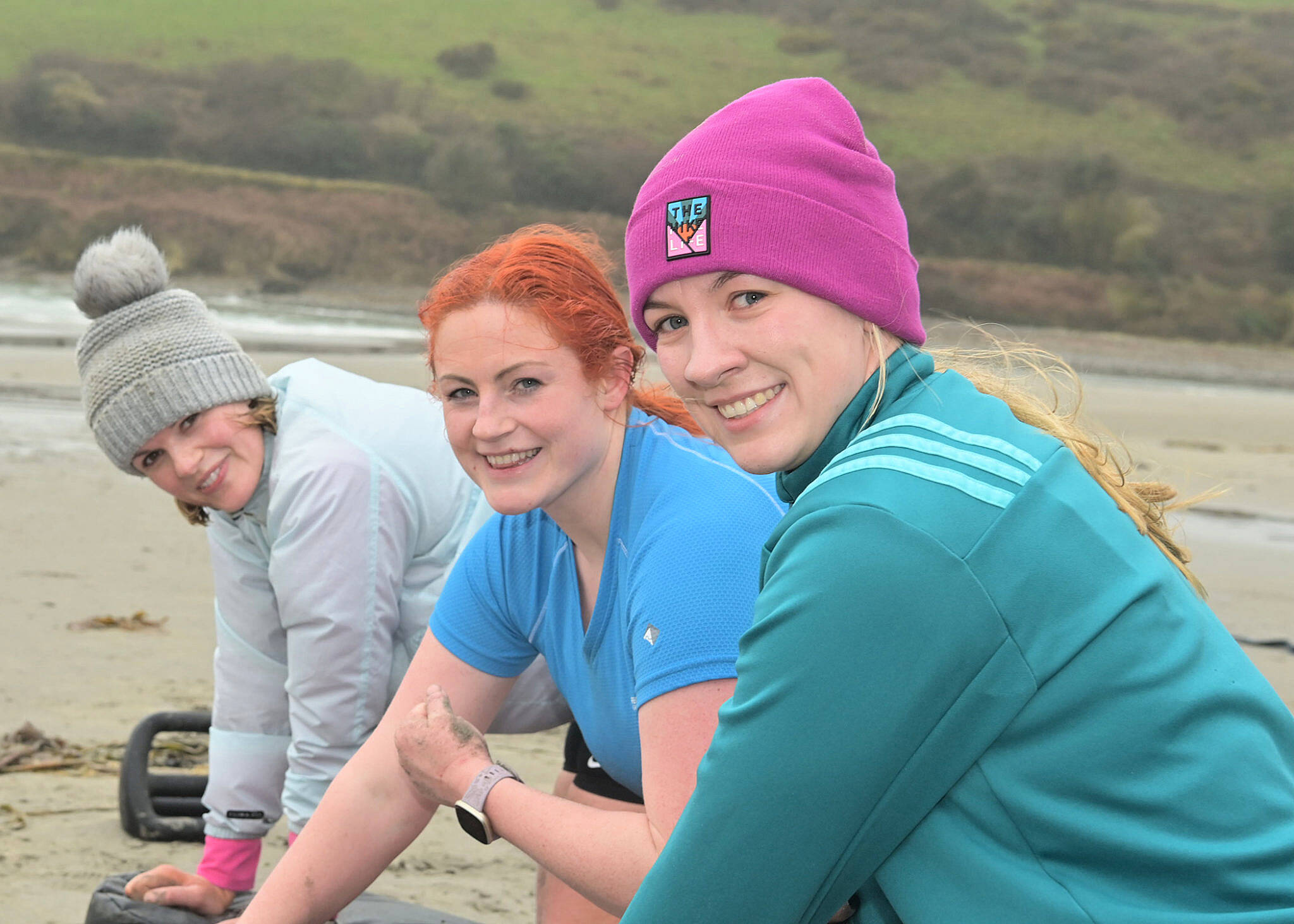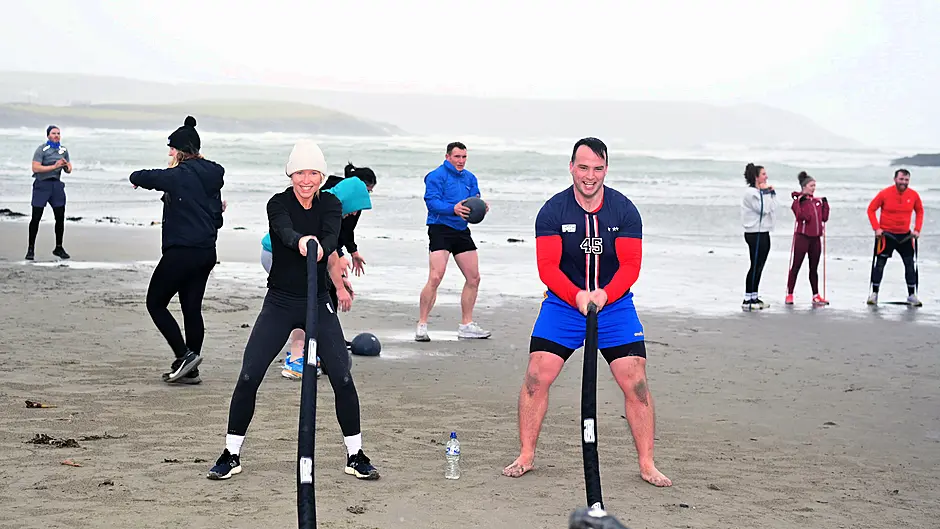A month into 2024, how are those great New Year intentions going? For many, they’ve already gone. MARY McCARTHY says spring is the perfect time for a reboot and, in fact, it might be even easier now
 Also working out were Martina Healy and Aimie Morehu from Glanmire and Annie Blewitt from Dunmanway. (Photo: Martin Walsh)
Also working out were Martina Healy and Aimie Morehu from Glanmire and Annie Blewitt from Dunmanway. (Photo: Martin Walsh)
IN January, New Year resolutions were made with enthusiasm. But by February, the truth of this commitment might be that it is flagging. But, don’t despair. There’s no better time than spring for some fresh inspiration as the days start to lengthen.
‘When it comes to eating and exercise, these are the hardest things to change compared to the rest,’ says Dr Samantha Dockray, a senior lecturer in applied psychology at UCC.
Factors that affect change can be described by the acronym comb: capability to change, opportunity, motivation, and barriers.
‘If you take losing weight,’ she explains, ‘the capability to change is determined by why you want to lose weight. It might be for appearance or health reasons. And at the same time understand that body weight is 50-70% determined by genetic factors. The motivation may include reducing risks to cardiovascular disease or fitting back into your clothes.’
‘Regarding doing more exercise,’ Dr Samantha adds, ‘there is a social opportunity in seeking support by joining a walking group or dance club. People in West Cork like to catch up and that keeps us motivated and honest.’
Barriers to achieving these goals can range from physical issues, like not knowing the information, or reflecting on it.
‘Psychological factors to change might be that it is too good for comfort. January is not the best month for making changes, particularly because it is dark. There are seasonal difficulties with some fruit and vegetables being unavailable. January is harder, because we naturally seek being cosy, comfortable, and warm.’
So February, therefore, might be an even better time for that reboot. The best advice is not to make any radical changes.
Remember that even a 5% weight loss has enormous benefits to health. If you lose weight too quickly, you tend to put it back so slow and steady is the way to go. With any change, there will be moments of blip, so rewards are a good idea.
Giving yourself gold stars really works when you notice a difference, such as being able to zip up your jeans. Other treats include going to the movies or taking a walk.
But, remember, food is not a reward, so keep your treats to items that won’t put a dent in all your hard work.
‘Time is given as an excuse and some say that they don’t have time to exercise or prepare a fresh meal,’ says Dr Samantha. ‘It is important to figure out when to prepare time for walking and meal planning. It is also good to know that we have a habit of doing things, and it is best to make small changes, otherwise you cannot sustain it.’
‘Knowing the reason why you do a particular behaviour is key. Address the cause and the reason. Why do you eat this chocolate bar? Can you divert this behaviour by seeing someone or breaking the routine? Practical steps include eating sufficient lunch to carry you to evening.’
She says when there is huge stress, having a mantra helps. Addressing what is going on is also crucial.
‘Nowadays, there are educational resources available online like websites and forums, which keep us informed. Just remember - every journey starts with the smallest step.’
‘Losing weight is an important goal to set, because it is all about feeling better and having lots of energy. I have maintained my own weight loss for over 29 years,’ reveals Maura McCabe, Unislim leader in West Cork.
In addition to weekly in-person groups in Skibbereen, Clonakilty and Dunmanway, she hosts online webinars.
‘Weigh-ins and motivational talks are on health-related topics that are available for everyone,’ she explains, and says there are no foods you cannot eat.
‘The objective is to make lifestyle changes that are sustainable and learn the skills to maintain that weight loss. It is about eating less processed food and limiting the foods that are high in sugar and fat. We recommend regular exercise, relaxation, and adequate sleep.’
Maura’s own tips for maintaining weight loss are having a smaller plate with the perfect balance at mealtimes, approx 1/2 fruit/veg, 1/4 protein and 1/4 carbohydrates.
‘I enjoy the occasional weekly treat – chocolate is my thing – and being in control of the amount, but daily exercise is part of my lifestyle.’
As a New Year’s resolution, lifestyle areas to look at to stay healthy are diet, sleep and having stress maintained,’ claims Sarah O’Brien, the HSE’s national lead for healthy eating and active living.
‘Poor sleep affects how the body stores energy and makes it difficult to manage weight. A good strategy is sleeping for seven to eight hours at night. It is wise to have a bedtime routine, the same time for going to bed every night and getting up.’
Sarah says it’s best not to drink caffeine for four to six hours before bed. Screens should be avoided for an hour before lying down to rest, and some people find reading a book relaxing.
‘Exercising daily for 30 minutes at any activity improves the quality of sleep,’ she points out. Stress is a natural part of life. But too much stress can be harmful, she warns.
‘You need to examine what is causing it and what to consider doing about it. That might include talking to a friend or colleague, taking the free online programme about stress from the HSE www.stresscontrol. ie or talking to your GP.
‘While the New Year is a fresh start to make changes for a healthy lifestyle, anytime is good.’
Seven ways to keep your goals
1. The psychology to making changes includes goal-setting and planning, so set small goals and detailed plans.
2. Decide on why you are making this decision. Without motivation, you cannot make it happen.
3. Make a commitment so you have a practical plan to change, replace it with a different behaviour, and stick to it.
4. Reflect: Without insight, you tend to go back to old habits.
5. Know the behaviour, declare to yourself that you are making changes, voice it to others.
6. Small steps can lead to long-term change – so recognise what you have done so far.
7. Small wins lead to success. Celebrate it when it happens.










